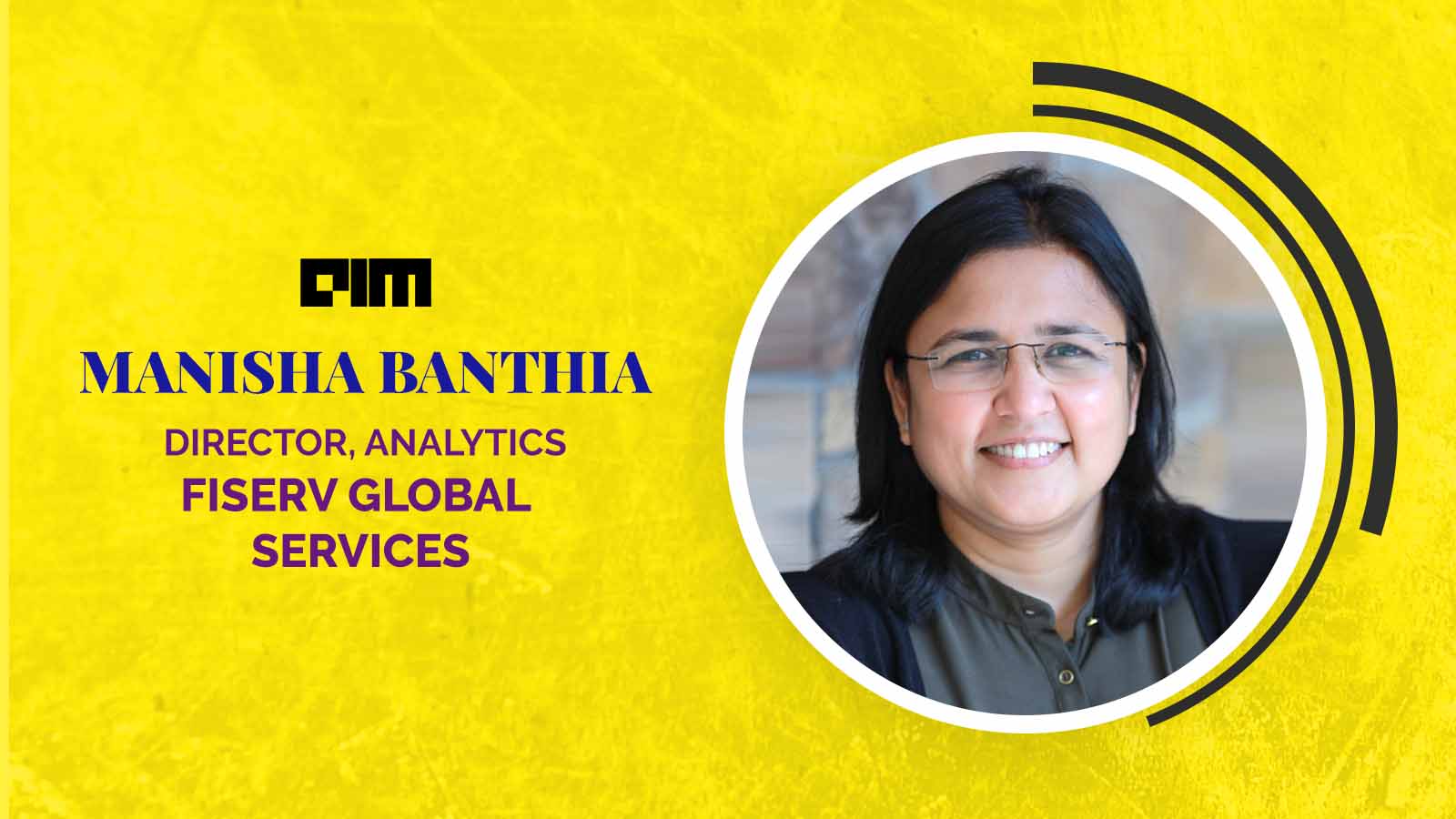Struggles in the banking and finance space aren’t unique to the COVID pandemic; however, the economic downturn due to the outbreak has indeed aggravated the situation. With the rapid change of customer behaviour, the financial companies are going under a significant transition of keeping up their relevance amid this crisis. Not only the industry is undergoing a shadow of looming job loss but also witnessing the rush of automation.
Currently, the commercial banking segment is undergoing a massive revolution with artificial intelligence, machine learning, real-time analytics, as well as the personalisation to achieve success. Fiserv, the global provider of payments and financial technology services and solutions, is one such company that has been around this drastic transformation of the industry and has been enabling an innovative financial solution for its customers.
To understand the landscape better, and how Fiserv is making a difference, we got in touch with Manisha Banthia, the Director of Analytics at Fiserv Global Services. With over 23 years of experience in financial analytics, Manisha Banthia is currently heading the Analytics Practice at Fiserv Global Services. Prior to this, she has headed the analytics team at Infosys Consulting and built analytics solutions for Citibank — Asia Pacific, American Stock Exchange and Country Financial, during her stint in Oracle. Manisha has also worked in the domains of marketing analytics, financial performance, as well as fraud and risk analytics.
Here is the edited excerpt:
How do you witness analytics evolving today in the financial industry as a whole? What are the most important trends that you see emerging in the analytics space across the globe?
New financial products, digital and payments transformation and personalisation engines have made analytics in the financial industry an interesting yet challenging space. While the focus of analytics has been on risk management and customer marketing, we are now seeing the application of analytics for decision making in other nuanced areas such as creating optimisation models for better capacity planning and predictive maintenance for ATMs.
Additionally, there is increasing usage of analytics to gather actionable sales and marketing intelligence, such as visitor segmentation on mobile and web-based banking applications. The use of natural language programming (NLP) for text analysis of customer services and surveys and intelligent automation like leveraging Intelligent and optical character recognition for cheque frauds and cards disputes are also the evolving areas.
Artificial Intelligence and virtual assistants or conversational AI are other areas that are being rapidly adopted by financial institutions for enhancing the client experience. For example, the advisor experience solution from Fiserv provides immediate personalisation hyper-targeted to each advisor. It delivers precisely the appropriate educational content and products designed to help advisors make more informed decisions, grow their businesses and aid in their clients’ financial goals. The emergence of citizen data scientists, AI platforms, and AI on the cloud is going to create more opportunities and keep this space interesting.
Mention some of the impediments in the area. What is Fiserv’s strategy towards tackling those challenges?
Selecting the appropriate infrastructure, tools, and technology is essential if data is to provide useful insights and not just create more noise. We have a matrix of business requirements vs technologies and tools that we leverage to decide the best mix of these components across analytics programs. Since technology and toolsets are evolving, we are also keeping ourselves abreast and keeping the matrix evolving.
What is your approach to face the challenge of meeting the needs of so many clients across vast geographies with limited resources?
Resources translate into three categories — data infrastructure and secure access, continuously evolving toolsets and most importantly, people. We keep technology options open rather than sticking to a single stack as we serve both large and small/medium businesses. This requires cross-skilling of people while maintaining experts for each stack. The toolsets, on the other hand, are rapidly evolving, not just in the AI and machine learning space but also in visualisation and narrative sciences. We have a strong learning and development program with a team culture of continuous learning that thrives on inclusive innovation of prototype building. We believe in practical applicability of the skill sets and not mere certifications.
We will begin to follow a philosophy of ‘Democratisation of AI’ by gradually building a culture of citizen data scientists in which data models and analysis, once established, are managed by business teams, while the analytics team moves on to solve the next business problem. A good talent acquisition program with a mix of engineering, programming, mathematics, statistics, and financial services domain expertise is what has helped us succeed and cross-train our teams.
Can you share a case study where you used your analytics-based solution to address the business challenge for one of your clients? How did they see value out of your solution?
We had developed an ML-based analytical solution to help a business reduce false alarms and identify true ATM service failures, thus reducing service costs and improving customer experience. This was done by automating ATM service calls based on criteria such as a complete absence of withdrawal transactions in a specified time period on a given day of the week. This approach is now being scaled and deployed for multiple clients with minimal customisation.
What are the key value propositions in your analytical solutions compared to the ones already in the market?
We are building analytics products and solution frameworks in house rather than focusing only on services or an advisory play. We are combining digital analytics in all our analytical programs to understand customer behaviour as we see organisations focus on their digital transformation programs.
What does Fiserv’s future look like in a data-driven industry? What are the next steps for analytics at your organisations?
Data-based decision making is emerging as a norm across organisations. However, what is required is proactive data-based decision making, using timely actionable insights, which can now be achieved using AI and ML. The road ahead is to make use of techniques such as graph networks for fraud detection, intelligent automation for operations efficiency, digital analytics and creative AI. Additionally, we are making available a Customer Data Platform that spans digital products and offers more personalisation and effective digital marketing with known and unknown data.
What are a few things that organisations should be doing with their analytics efforts that most do not do today?
Most organisations are focused on analytics services and advisory services. It is important to create assets in the form of frameworks, codes, model validation programs, as well as for analytics products.
Organisations are also restricting analytics to ‘traditional areas’ like risk and marketing and not expanding it to all business areas. There are opportunities for applying analytics not just for revenue generation but also to drive cost efficiency and customer satisfaction. Analytics teams usually consist of statisticians or programmers but giving importance to domain expertise is critical.
Organisations need to hold update sessions with all members of the team on the scope of the project and how will the business benefit. Further, it needs to encourage continuous learning and domain expertise development programs, as well as share learnings across teams and projects and do not work in business / or project silos.
What is your suggestion to new graduates who are aspiring to get into financial services analytics space? What are the typical skill sets you look at while recruiting in analytics?
Having an attitude of learning continuously is the key to survive in the financial analytics space. Financial services analytics is a fast-changing space, and therefore, agility in moving forward with knowledge and hard work is required. Be equipped with the basics of newer technologies, understand the importance of learning and following practices such as unbundling of neural network codes, champion the challenger models and interaction with data visualisation. It is also important to understand how the model was applied in the business and its contribution to business strategy building.
While recruiting, we look for problem-solving skills and the ability to acquire knowledge of new techniques. Our hiring is business aptitude and case-study based apart from programming and technical aspects.



















































































